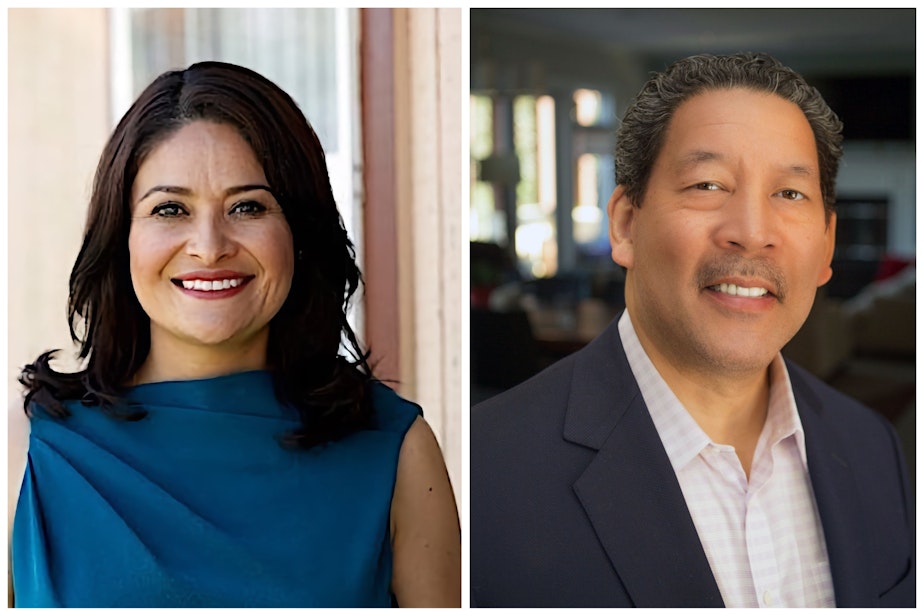'This is going to be a really close race.' How the election for Seattle’s next mayor could play out

A crowded race to become Seattle's next mayor is down to two candidates, current City Council President Lorena González, and former Council President Bruce Harrell.
KUOW’s Paige Browning spoke to Crosscut political reporter David Kroman about his analysis of the primary. He says he’s not all that surprised by the results.
This interview has been edited for clarity.
David Kroman: In a summer, off-year primary, with 15 people running for mayor, I think name recognition goes a really long way. People know Lorena González, and people know Bruce Harrell. Harrell was on the council from 2007 until 2019. González was elected in 2015, and before that worked for the mayor. These are fairly well-known figures.
Despite a lot of conjecture that people are tired of the city council, I think the fact that the two of them were known entities kind of overcame the fact that they have this really long history, both of them, on the city council.
I also think that what this race showed us is that newspaper endorsements still really matter. In my mind, this race was basically decided when The Stranger endorsed Lorena González, and The Seattle Times endorsed Bruce Harrell. With so many candidates in the race, us in the media try to do the best to inform people, but a lot of folks maybe don't have quite as much information as they'd like, so they go with the outlets that they trust.
Paige Browning: In the general election, would González or Harrell expect more of the votes that went to progressive candidates?
Sponsored
That's always a really hard game to play. For whatever reason, it's just never that clean. The math never really breaks down. For one, we'll have higher turnout in the general election, and people have a little longer to get to know these candidates.
You have to hit the reset button on this. This is now a two-person race. I don't know where the voters who went for Colleen Echohawk, or Jessyn Farrell, or some of the other people will go. That will all be shaken out in the debates in the months to come.
González and Harrell have come down on opposite sides on a lot of things, including the charter amendment called Compassion Seattle. It will be on the November ballot and would require the city to create 2,000 more shelter beds. Harrell says he supports it. González does not. How do you see this issue playing into the race?
I think that this issue will actually be a pretty big deal in the race to come. Sometimes, candidates in Seattle are all basically progressive. The result of that is you get these kind of wedge issues that become clear dividing lines. I think the Compassion Seattle charter amendment has the possibility to be that; one clear issue where the two of them disagree.
Council President González disagrees with it because she has doubts about an amendment saying that the city must build 2,000 new units without any guaranteed extra revenue. The charter amendment does not provide the city any more money to do that. It also contains some language around public camping and public encampments that has made a lot of people on the left really uncomfortable that this amendment could clear the door for more so-called sweeps.
Sponsored
Harrell, on the other hand, sees this as kind of the stick that maybe the city has been lacking over the last few years, which is you’re kind of etching into stone this mandate that the city [would] be adding more indoor space, and keeping its public spaces clear of tent encampments.
For people who are looking for why Person A vs. Person B, this might be something that they look to.
Are you expecting a tight race this fall?
Yes, I think it's going to be a very tight race. I say that because while, currently, Bruce Harrell is up by about 10 percentage points, the later ballots in Seattle and King County almost always heavily favor the person who's perceived as the more progressive of the two. In this case, that's Council President González.
I would guess that in the next few days that 10 point gap is going to narrow considerably, probably to within four or five points, which, when you're when you're going from a primary to the general election, I think you can pretty much read that as a tie. So, yes, I expect that this is going to be a really close race and we're not going to have really any indication of who's out on top until election night in November.
Sponsored
Listen to the interview by clicking the play button above.





